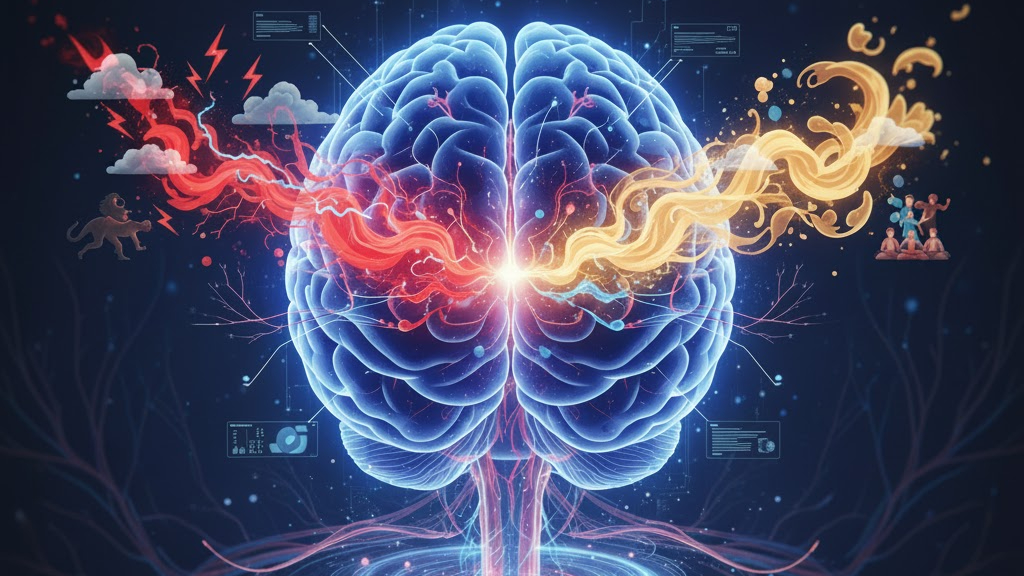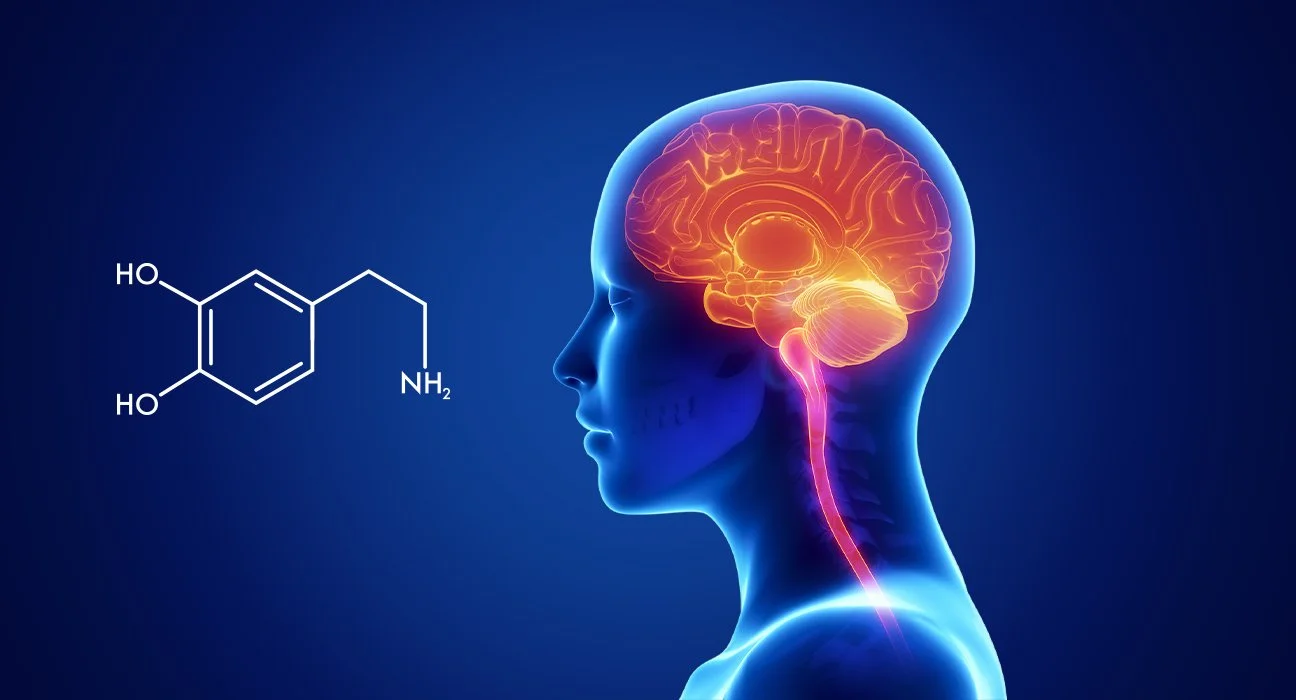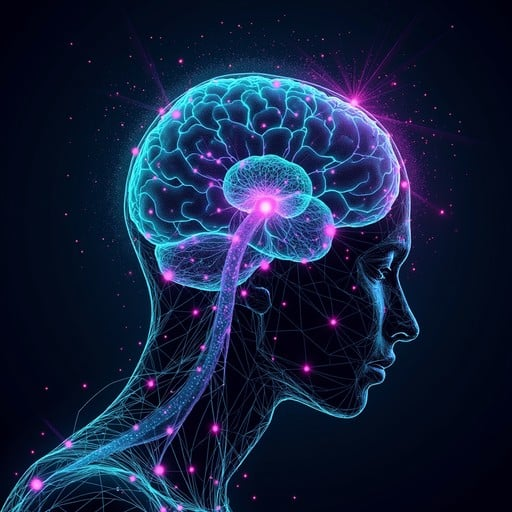The Chemistry of Emotions: Why You Feel What You Feel

Where Emotions Begin: Inside the Brain’s Control Center
Behind every moment that shakes you, comforts you or excites you lies a quiet storm of chemicals working inside you.Every emotion you experience,joy, fear, sadness or excitement begins in the most powerful organ in your body, the brain. It is here that signals are interpreted, memories are stored and reactions are triggered but emotions are not just abstract feelings,they are chemical messages traveling rapidly through your nervous system, shaping how you respond to the world around you. When something happens, good or bad, the brain instantly evaluates it, often faster than you are consciously aware. As Candace B. Pert notes, “When emotions are expressed, all systems are united and made whole, The body is not a mindless machine, the body and mind are one.” This perspective reminds us that emotions are both physical and psychological, intertwined with every part of our being.
The limbic system is the emotional headquarters of the brain. It contains structures like the amygdala, hippocampus and hypothalamus, each one playing a unique role. The amygdala triggers immediate reactions like fear or excitement, while the hippocampus helps you attach memories to these feelings. The hypothalamus, on the other hand, sends instructions to your body, raising your heartbeat, tightening your stomach or releasing certain hormones based on the emotion you’re experiencing.
These emotional reactions have evolutionary roots. Long before modern life, humans relied on rapid emotional responses for survival. Fear, signaled danger and anger pushed them to defend themselves and joy helped them bond with others. Even now, in a world filled with smartphones instead of predators, those deep-rooted emotional mechanisms remain the same. The difference is that instead of running from a lion, you’re reacting to traffic jams, arguments, social media posts and life’s daily stressors all triggered by the same ancient system.
Understanding this ancient wiring explains why modern emotional triggers sometimes feel exaggerated. Your brain hasn’t evolved as quickly as your environment, it still treats certain stressful moments as survival threats. This mismatch creates intense emotions over seemingly small issues, not because you’re weak or dramatic but because your emotional hardware is working exactly as it was designed to.

Hormones and Neurotransmitters: The Real Messengers of Your Feelings
Emotions do not exist without chemistry. The brain communicates through neurotransmitters and hormones, tiny chemical messengers that influence how you think, behave, and respond. Dopamine, serotonin, oxytocin, cortisol and adrenaline are just a few of the compounds shaping your emotional world. Each one plays its own role, sometimes working together and sometimes against each other.
Dopamine is the “reward chemical,” released when something feels good, achieving a goal, eating your favorite food or receiving a message from someone you like. It motivates you to repeat pleasurable activities. Serotonin helps regulate mood and well-being, when it is balanced, you feel calm and centered but when it drops, feelings of irritability or sadness can emerge. Oxytocin, often linked to bonding and trust, rises during hugs, deep conversations or meaningful connections.
Then there are the stress-related chemicals, cortisol and adrenaline. These two work together when your body senses a threat. Adrenaline acts first, speeding up your heartbeat and sharpening your senses so you can react quickly. Cortisol follows, keeping the body alert and ready. This is why strong emotional experiences like fear, shock, or excitement feel so physical, your blood pressure rises, your breathing changes and your muscles tighten. Emotions are chemical events with real physical consequences.
What makes these chemicals even more fascinating is their sensitivity to lifestyle. A poor night’s sleep can lower serotonin. Constant scrolling can overstimulate dopamine until nothing feels rewarding anymore. Lack of meaningful connection can suppress oxytocin, making loneliness feel heavier. Even diet affects emotional chemistry, foods rich in omega-3, magnesium and B-vitamins support healthier neurotransmitter production. When you realize how deeply everyday habits influence your emotional chemistry, you gain more power over your moods than you ever imagined.

Why Emotions Feel So Intense: The Adrenaline Connection
When something scares or excites you, a rush of adrenaline surges through your body. That surge is not just psychological, it is a biochemical reaction designed to prepare you for immediate action. This is why your hands shake during anxiety, why your stomach feels tight when you’re nervous or why your heart races when you hear surprising news. Adrenaline sharpens your senses and focuses your attention, making every emotion feel amplified.
Adrenaline isn’t only for fear. It also fuels excitement, motivation and anticipation. The thrill of performing on stage, the rush of getting good news, the spark of attraction when seeing someone you like, these moments are powered by adrenaline. The chemical does not differentiate between positive and negative experiences, it simply reacts to intensity. This is why some situations leave you breathless, energized or overwhelmed even if they last only seconds.What many people don’t realize is that adrenaline can linger. Even after the moment has passed, your body may still feel restless or unsettled because your hormonal system is still calming down.
This explains why some emotional experiences feel heavier than others and why strong feelings can influence your behavior long after the trigger is gone. This lingering effect can shape the choices you make without you realizing it. People often misinterpret adrenaline as intuition, reacting impulsively simply because their bodies remain in a heightened state. Others confuse the physical rush of adrenaline with love, anger or certainty. Recognizing the difference helps you slow down and respond rather than react. Learning to breathe deeply, take pauses and ground yourself gives your body time to return to equilibrium and helps you understand your true feelings beneath the chemical storm.
The Harmony of Emotions: How Your Brain Balances the Chemical Storm
Your brain constantly tries to balance emotional chemicals, keeping you grounded even when life becomes chaotic. When cortisol rises during stress, the brain eventually releases serotonin to soothe you. When dopamine surges during happiness, other chemicals regulate the intensity so you don’t become overwhelmed. This constant chemical balancing act is the reason you don’t stay angry, scared or euphoric forever.
However, this system can be disrupted. Lack of sleep, poor diet, chronic stress, or emotional trauma can interfere with your brain’s ability to regulate chemicals correctly. When that happens, even small situations can feel heavier and emotions may swing more intensely than usual. It’s not a sign of weakness, it’s simply chemistry out of balance. Understanding this helps remove shame from how we feel and replaces it with compassion and curiosity.
The most comforting truth about emotional chemistry is this, feelings are temporary because chemicals are temporary. Your body releases them, uses them and then resets. No emotion lasts forever, joy, fear, nor sadness. By understanding the chemistry behind your feelings, you can learn to navigate them more gracefully, recognizing that every emotion has a beginning, a purpose and an eventual end. Emotions aren’t mysteries, they are messages written in chemistry. Your brain is constantly decoding the world, your body is constantly responding and your feelings are simply the language they use to communicate. your feelings aren’t flaws, they’re science, beautifully wired, uniquely yours and always working for your survival.
You may also like...
If Gender Is a Social Construct, Who Built It And Why Are We Still Living Inside It?

If gender is a social construct, who built it—and why does it still shape our lives? This deep dive explores power, colo...
Be Honest: Are You Actually Funny or Just Loud? Find Your Humour Type

Are you actually funny or just loud? Discover your humour type—from sarcastic to accidental comedian—and learn how your ...
Ndidi's Besiktas Revelation: Why He Chose Turkey Over Man Utd Dreams

Super Eagles midfielder Wilfred Ndidi explained his decision to join Besiktas, citing the club's appealing project, stro...
Tom Hardy Returns! Venom Roars Back to the Big Screen in New Movie!

Two years after its last cinematic outing, Venom is set to return in an animated feature film from Sony Pictures Animati...
Marvel Shakes Up Spider-Verse with Nicolas Cage's Groundbreaking New Series!

Nicolas Cage is set to star as Ben Reilly in the upcoming live-action 'Spider-Noir' series on Prime Video, moving beyond...
Bad Bunny's 'DtMF' Dominates Hot 100 with Chart-Topping Power!

A recent 'Ask Billboard' mailbag delves into Hot 100 chart specifics, featuring Bad Bunny's "DtMF" and Ella Langley's "C...
Shakira Stuns Mexico City with Massive Free Concert Announcement!

Shakira is set to conclude her historic Mexican tour trek with a free concert at Mexico City's iconic Zócalo on March 1,...
Glen Powell Reveals His Unexpected Favorite Christopher Nolan Film

A24's dark comedy "How to Make a Killing" is hitting theaters, starring Glen Powell, Topher Grace, and Jessica Henwick. ...